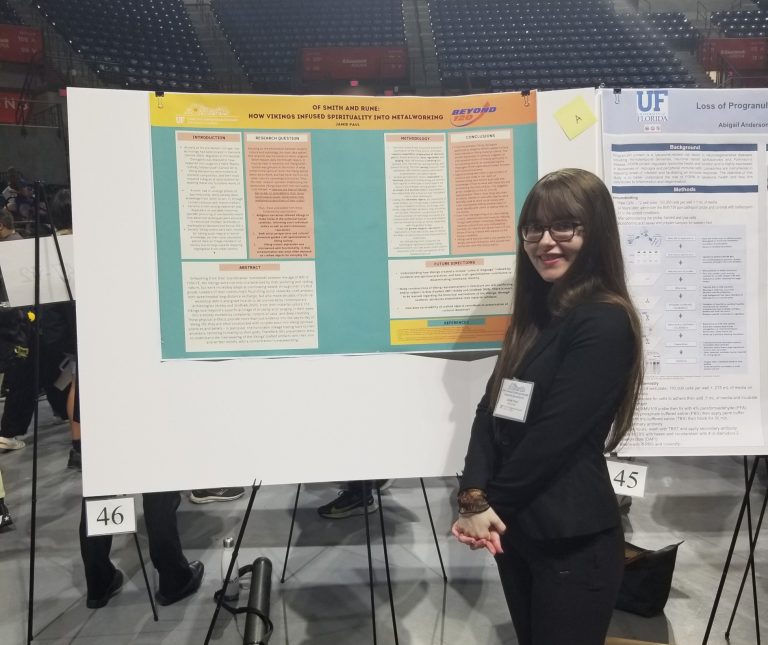
A set of Scandinavian runes. Elena Shi/Adobe Stock.
Coming Full Circle
A new Medieval Studies graduate finds success with help from the program's first graduate
One of the college’s newest graduates in medieval studies, Jamie Paul, found her academic calling with the help of the program’s very first graduate.
Paul wasn’t quite sure what she wanted to major in when she arrived on campus. She considered criminology but quickly found out that the law aspect of the field didn’t quite pique her interest.
However, there was one part of the discipline that drew her attention. “I was really interested in understanding how people get to points where they commit crimes, or what you can tell about people and their actions,” Paul explained.
That curiosity led her to pursue a major in anthropology, where she explored human behavior in-depth. As an enthusiast of fictional fantasy properties like “Lord of the Rings,” “World of Warcraft,” and “The Witcher,” Paul started exploring the Center for Medieval and Early Modern Studies (MEMS), one of the newest centers in the College of Liberal Arts and Sciences. The coursework was the perfect combination of her interests and academic pursuits, so she decided to pursue a double major in Anthropology and an Interdisciplinary Studies major focused on MEMS.
Paul’s first MEMS class was taught by none other than Valerie Hampton. A board member and adjunct instructor for the college, Hampton was also one of the first graduates of the MEMS program. Paul was one of Hampton’s first students, and the two hit it off instantly during Hampton’s Castles & Cloisters class.
Hampton was impressed with Paul’s passion for the subject and was more than happy to lend her expertise to help her student succeed. “Paul excelled in my class and fell in love with the Middle Ages,” Hampton recalled. “We worked together on her Interdisciplinary Studies application and I wrote her a letter of recommendation — from there, she became my student.”
Over the next few years, the two collaborated closely. Hampton helped Paul narrow down her thesis topic and gain access to research materials. In return, Paul helped Hampton by becoming a teaching assistant, creating new program materials and developing One Credit to Rule Them All (OCRA), a workshop series inspired by the “Lord of the Rings” series.

Paul’s thesis went through several iterations before she settled on European Viking society. Specifically, she wanted to look at their mythology and how it was portrayed in their art and craftsmanship. For example, stories of the Norse trickster god Loki might have inspired them to create loaded dice to cheat during games.
Due to pandemic travel restrictions, Paul couldn’t travel to any Viking sites as she had hoped. But with Hampton’s help, she accessed a wealth of online resources, including a vast database of manuscripts and detailed scans of Viking sites. Hampton showed Paul how to access foreign libraries with manuscripts and handle rare books, as well as how to find digital options where available.
Now, Paul is planning a move to the U.K. to attend graduate school at the University of York. There, she plans to continue her work with Viking culture and pursue her interests in digital humanities. She’s thrilled at the prospect of visiting Viking sites in person. Paul remains open to where her studies take her after graduate school, but she’s confident she’ll find her way in Europe, where she can immerse herself in the cultures she wants to study.
Paul attributes a big part of her success and passion to the size of the Medieval Studies program. “It’s a very small program,” she said, “but we were very close, and I was able to do a lot of networking. I’m hoping to make a lot more connections once I get to York!”


